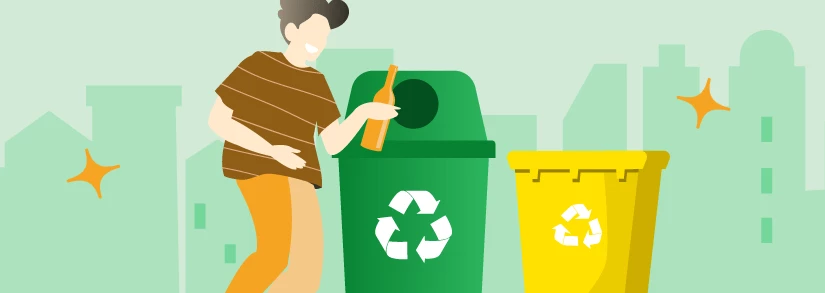Recycling Centres Ireland: How to Use and Find Yours

Recycling centres and civic amenity sites are essential elements of household waste management, providing supplementary options when domestic bins are insufficient or when disposing of specialized materials.
Defining Waste Disposal Facilities
Understanding the different types of disposal facilities is crucial to ensure correct waste segregation and to avoid unnecessary travel or unexpected charges. The terms used for these sites often overlap, but their core functions differ in Ireland.
Important Note: Disposal sites may have varying acceptance policies, even within the same category (e.g., one Civic Amenity Site may accept large furniture while another may not).
Always check the facility's official website or call ahead for unusual or bulky items to confirm they can be accepted and to check for any associated fees.
Let’s detail the different types of waste centres:
Bring Banks
These are unstaffed, satellite collection points for a highly limited range of recyclable materials, typically glass bottles, aluminium/steel cans, and textiles (clothing). They are free to use and usually located in accessible areas such as town centres and large car parks.
Recycling Centres
These are staffed facilities operating during set hours. They accept a wider, though still limited, variety of materials than Bring Banks. They generally focus on common household recycling (paper, plastic, glass) and often have limited capacity for bulky items.
Most recycling of basic packaging waste is free of charge.
Civic Amenity Centres
Often synonymous with the term "Recycling Centre" in common usage, Civic Amenity Sites offer the most comprehensive range of services.
They can accept a significantly wider variety of waste, including:
- Bulky Household Waste (furniture, carpets, mattresses, etc.)
- White Goods and Electrical Appliances (WEEE)
- DIY and Construction Waste (timber, plasterboard, tiles)
- Green Waste
- Bagged General Household Waste (often with a charge).
- Household Hazardous Waste (HHW) – this is a critical difference. HHW (e.g., paints, varnishes, cleaning agents, pesticides) is often accepted at these sites, sometimes through specific collection events or limited acceptance limits, and may incur a charge.
WEEE Centres (Waste from Electrical and Electronic Equipment)
WEEE facilities, or designated drop-off points at Civic Amenity Sites or retail stores, specialise in the processing of electrical and electronic items.
Proper disposal of e-waste is legally required because these items contain materials that can be highly damaging to the environment and are often free to dispose of.
Accepted items include:
- Batteries (household and car)
- Fridges, freezers, and all white goods
- Electronic tools (drills, toasters)
- Lighting equipment (fluorescent lamps, light bulbs)
Landfill
The final step in the waste hierarchy, landfill sites are only for material that cannot be reused, recycled, or recovered. They should be considered a last resort.
Landfills frequently impose an admittance fee and should be avoided in line with the goal of the circular economy.
What Materials are Commonly Accepted?
All items brought to a centre must be clean, sorted, and safe to handle.
Items contaminated with food or chemical residue may be rejected.
✅ Commonly Permitted for Free Recycling
- Glass: Bottles and jars (caps and lids recycled separately, if possible).
- Paper: Newspapers, magazines, office paper, junk mail.
- Cardboard: Light cardboard and packaging (must be flattened).
- Plastics: Bottles, rigid plastic containers, drink cartons.
- Metals: Aluminium cans, steel tins, foil.
- Textiles: Clean clothes, bed linen, towels, coats.
- WEEE: White goods, electrical appliances, batteries, fluorescent tubes (often free of charge).
❌ Commonly Not Permitted (Check Civic Amenity Site for acceptance and charges)
- Specific Glass Types: Crystal glass, Pyrex, drinking glasses, television tubes.
- Non-Recyclable Ceramics: Porcelain, pottery, stones, tiles.
- Bulky Fabric Waste (usually charged): Carpets, rugs, mattresses, cushions.
- Contaminated Paper: Laminated or waxed papers (e.g., paper cups, soiled cardboard).
- Hazardous Waste: Paint, oil, chemicals (unless specifically accepted during HHW collection events at a Civic Amenity Site).
If your item is not listed, your next step should be to check the nearest Civic Amenity Centre for acceptance, as they handle a greater variety of bulky and specialized materials.
Financial Benefits of Using Recycling Centres
Most domestic waste collection plans—whether Standard, Pay by Weight, or Pay by Lift—have some form of weight restriction. Exceeding an annual limit or increasing the weight per lift will result in additional or penalty charges.
- Standard Service: Exceeding the annual weight limit results in a fine per kg (e.g., €0.20/kg).
- Pay by Weight: Heavier bins result in a direct increase in the variable charge component of your bill.
By utilizing free Recycling Centres or Bring Banks to dispose of excess segregated materials (like clean cardboard, glass, and cans), householders can significantly reduce the weight of their kerb side bins.
This simple proactive step can result in notable savings on penalties and variable charges.
How to Find Your Nearest Facility
The easiest way to find your local waste disposal facilities is via the national resource portal MyWaste.ie or by contacting your local authority. The waste section is typically listed under the Environmental Department of the County or City Council website.
Details of your local waste disposal facilities can be found by contacting your local authority, or by checking their website. The waste section is usually a subcategory within the environmental department, or alternately you may be able to search for recycling centres by typing the term into the search bar.
Local Authority Websites: Provide comprehensive information on opening hours, charges, and accepted materials for their official facilities.
Provider-Specific Centres: Some private waste collection companies, such as Bord na Mona and Thorntons Recycling, also operate their own waste disposal centres.
